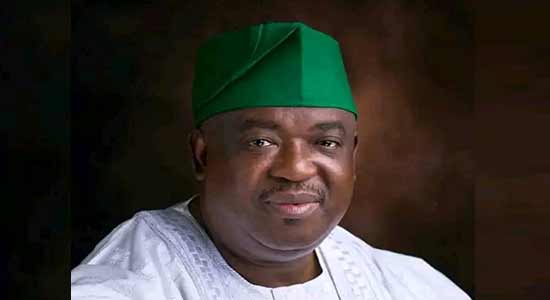- The hearing of his brief by the Supreme Court is on Tuesday.
- He listed eight reasons why the Supreme Court should validate his election as the governor of Plateau State
Caleb Mutfwang, the governor of Plateau State, claims the Court of Appeal treated him unfairly when it declared his election invalid.
He added that the appellate court had not provided him with a fair hearing.
He said that only one of the eight arguments he made to the Court of Appeal to support the legitimacy of his election was accepted.
He clarified that the Court of Appeal’s dismissal of the seven points he brought up went against the Supreme Court’s order that subordinate courts make decisions on all cases that come before them.
He pleaded with the Supreme Court to declare him the validly elected governor of the state..
Mutfwang, who made the submission in his brief at the Supreme Court by an eight-man team of Senior Advocates of Nigeria led by Kanu Agabi, said “The law is settled that wherever there is a wrong, there must be a remedy.”
The hearing of his brief by the Supreme Court is on Tuesday.
He said, “Eight issues were distilled and placed before the court below for determination. Unfortunately, only one issue (of jurisdiction) was determined by the court below leaving untouched seven issues.
“This court has stated in quite a number of cases that intermediate courts should pronounce on all issues placed before it. It should not restrict it to one or more issues which its opinion may dispose of the matter.
“This is to give the apex court the benefit of their views in the matter should there be need to consider other issues not determined by the intermediate court.”
Mutfwang insisted that since he was not given fair hearing, the Supreme Court should dismiss the judgement of the Court of Appeal, which invalidated his election.
He added, “It is our further submission that having denied fair hearing to the Appellant, with respect to the Notice of Preliminary Objection as well as a Motion to strike out the incompetent Grounds of Appeal,, the decision of the lower Court to dismiss same is, with all due respect manifestly flawed.
“The implication of denial of fair hearing renders proceedings null and void. See the case POROYE V. MAKARFI (2018) 1 NWLR (PT.1599) 91 AT 153, PARAS. D – E.
“We respectfully urge the Honourable Court to invoke its powers in Section 22 of the Supreme Court Act by upholding the Notice of Preliminary Objection of the Appellant embedded in his Brief before the lower Court and also granting the Motion of the Appellant filed on 2nd November, 2023 before the lower Court by striking out Grounds 1 – 9, 11, 12, 15, 16, 17, 20, 21 and 22 of the Notice and Grounds of Appeal of the 1st and 2nd Respondents.
He said he has attached enough evidence to prove that the Court of Appeal should not have cancelled his election.
He said, “We have demonstrably shown in this brief that, to all intents and purposes, the Judgment of the lower Court, with the greatest respect, has occasioned injustice of unquantifiable magnitude to the Appellant.
“The law is settled that wherever there is a wrong, there must be a remedy. This principle of law which is of considerable antiquity is expressed in the Latin maxim, ubi jus, ibi remedium.
“We therefore most respectfully urge the Honourable Court to allow the appeal, set aside the Judgment of the lower Court and thereupon affirm the Appellant as the duly elected Governor of Plateau State.”
He listed eight reasons why the Supreme Court should validate his election as the governor of Plateau State.
He said, “The issue of nomination and sponsorship, which underpinned Ground 1 of the Petition, is not only a pre-election but within the internal affairs of the 4th Respondent, and as such, the 1st and 2nd Respondents lacked the locus standi to canvass it.
“The Judgment of the lower Court delivered on 19th November, 2023 is fatally flawed for want of jurisdiction having regard to Section 285(2) of the Constitution (supra). Disobedience of Court Order is not one of the grounds for maintaining election Petition under Section 134 of the Electoral Act (supra), nor is it part of Section 177(c) of the Constitution (supra), let alone disqualifying the Appellant from contesting the election.
“At any rate, given the overwhelming oral and documentary evidence including but not limited to EXHIBITS U and 2RA3, the 4th Respondent complied with EXHIBIT G1 by conducting State Congress on 25th September, 2021 in Plateau State.
“The evidence of PW16 was thoroughly discredited and controverted and as such the lower Court was clearly in the wrong to have heavily relied on it against the Appellant.
“The 1st and 2nd Respondents woefully failed to discharge the requisite burden of proof on them and as such not entitled to the reliefs sought in their Petition more so that having impugned the election as invalid for non-compliance, it is absurd of them to lay claim to victory for the same election.
“The lower court was, with all due respect, in grave error when it held that the Tribunal was wrong in striking out the offensive paragraphs of Appellant’s Reply and in utilizing evidence of PW16, PW24, PW27 and PW28 as a Tribunal of first instance.
“The lower Court denied fair hearing to the Appellant by dismissing his Notice of Preliminary Objection as well as Motion to strike out certain grounds of the Notice of Appeal of the 1st and 2nd Respondents without properly considering same.”
